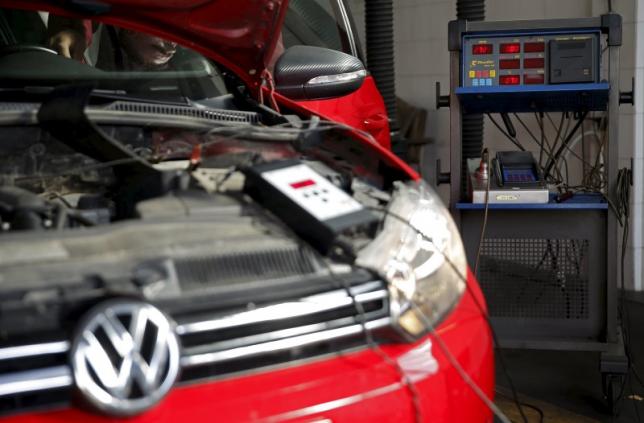

Germany's Volkswagen, the world's largest automaker by sales, has admitted it had rigged emissions tests in diesel-powered vehicles in the United States and US authorities said on Monday they would widen their probe to other automakers.
The following are some facts about diesel car engines, the tailpipe pollution they emit and the "defeat device" software that federal regulators say VW used to circumvent emissions standards set by the US Environmental Protection Agency (EPA) and the state of California.
DIESEL ENGINES - They are higher compression than gasoline engines and do not require spark plugs for ignition. They tend to be more durable and less prone to expensive early repairs. However, they require more frequent oil, air and fuel filter changes, to prevent damage to fuel injectors.
DIESEL FUEL - It is less refined and more energy dense than gasoline, converting heat into energy more efficiently, sending less heat out the tailpipe than gas-powered vehicles. It used to be cheaper at the pump than gasoline, which was a selling point for diesel cars, but in the United States, its price is currently above the price for gas.
FUEL ECONOMY - Diesels can get up to 30 percent more miles per gallon of fuel than similar gas powered cars and can be more economical than gasoline-electric hybrids.
PERFORMANCE - Many diesel engines produce more torque than gasoline engines for a given displacement due to their higher compression ratio. While they can accelerate quickly and have good towing power, diesel cars once had a reputation for being noisy and slow. More recent diesels from VW and other manufacturers have attacked those shortcomings with turbochargers, more precise combustion and additional hardware to curb emissions.
EMISSIONS - Because diesel fuel is heavier and oilier than gasoline it can be more polluting, earning a reputation for sootiness when it came into wider US automotive use during the 1970's oil crisis. But the pollution from diesel engines is mainly nitrogen compounds. They emit lower amounts of carbon monoxide, hydrocarbons and carbon dioxide than does gasoline.
POLLUTION CONTROLS - The biggest challenge for automakers is controlling emissions of nitrogen oxides, or NOX. Many automakers use pollution control systems that inject a derivative of urea into the exhaust-cleaning process, in order to meet strict U.S. and European standards.
COST - Because of the extra equipment and process needed to clean their diesel exhaust, diesel cars are more expensive than their gasoline counterparts.
VW'S DEFEAT DEVICE - The software switched on when the automobiles were being tested for compliance with EPA standards, turning off during normal driving to allow maximum engine performance. The algorithm used information about how the car was being steered, how long the engine ran and atmospheric pressure to "precisely track" the conditions that corresponded to a federal emissions test, according to the EPA.
Sources: CarandDriver.com; Carsdirect.com; Dummies.com, Auto Repair For Dummies, 2nd Edition; Wikipedia
Reuters




